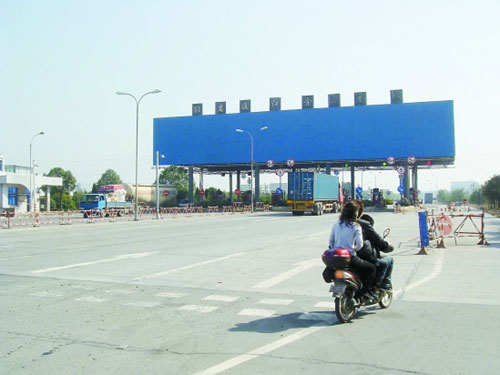(Ecns.cn)--Toll roads were previously considered a necessity that benefited the nation and its people, marking a major step forward in the development of China's expressway construction over a thirty year period. But now many fear that a backlash caused by illegal toll collections could trap the industry in a vicious circle.
On June 20, China's five central government departments - the ministries of transport, finance, supervision, the National Development and Reform Commission and the State Council Office for the Rectification of Unhealthy Working Styles - jointly launched a campaign to crack down on illegal toll collection.
A much-anticipated action, it received high praise from the public. But many also questioned the effectiveness of the campaign, saying that the government must get to the root of the matter in order to cure a systemic problem.
The most profitable sector
According to a report released by China Business News, the 19 expressway companies listed on the Shanghai Stock Exchange's A-share market increased annual profits a combined 20% to about 12 billion yuan (about $1.86 billion) in 2010, overtaking other industries such as real estate and petroleum.
To achieve sustainable GDP growth, local governments are relying on high toll collections, and many expressway companies are directly linked to local governments. A report by Nanfang Weekly revealed that many board members of the 19 listed expressway companies are government officials from local transport departments.
That means the toll collection policy is a complicated systemic issue involving many different parties, and despite the central government's repeated orders and injunctions, local governments have done little to crack down on illegal toll collection, since they are the beneficiaries.
Moreover, to maintain economic growth, local governments continue to take out more loans for expressway projects. If toll income is insufficient to make monthly loan repayments, governments must either increase the price of tolls or prolong the toll-charging duration beyond the authorized period.
For example, the expressway from downtown Beijing to the Beijing Capital International Airport was completed in 1993 with a total investment of 1.16 billion yuan (about $179.3 million), including loans of 765 million yuan (about $117 million). By 2005, the expressway had already collected 3.2 billion yuan (about $495 million) from its toll collections. Nevertheless, its toll collection period was extended till the end of 2022.
Banks part of the problem
After the announcement of the campaign on June 20, news came that a toll road in southwest China's Yunnan Province was nearing insolvency because of about one hundred million yuan (about $15 million) in debt that it could not pay.
The toll road extends about 200,000 kilometers and is a project of the Yunnan Expressway Development Investment Corporation, which had registered capital of only 5 billion yuan (about $773 million), but over 90 billion yuan (about $13.9 billion) in loans for its road project from more than ten banks, including China Development Bank, China Construction Bank and the Industrial and Commercial Bank of China.
Even if the local government raises tolls from 0.5 yuan to 1 yuan (about $0.15) per kilometer, income from the road in Yunnan would still not be enough for its monthly repayment.
In the past ten years banks have been keen to provide loans to local governments for road construction projects, which are dogged by a comparatively weak supervisory system leading to illegal activity.
Without a doubt, the public are the primary sufferers of the "Great Leap Forward." As local governments either increase the price of tolls or prolong toll-charging durations, people must take on a burden that should not belong to them.
Campaign on road tolls
By July 6, nine municipalities or provinces, including Beijing, Tianjin and Shandong had kicked off action targeting illegal tollbooths, according to sources from the Ministry of Transport, possibly signaling the beginning of a nationwide campaign.
According to the announcement, the year-long campaign aims to lower overpriced tolls, reduce the total number of tollbooths and close tollbooths that collect money beyond authorized periods.
Nevertheless, many experts are pessimistic about the effectiveness of the campaign, as they believe it will only intensify the tussle between central and local governments.


















